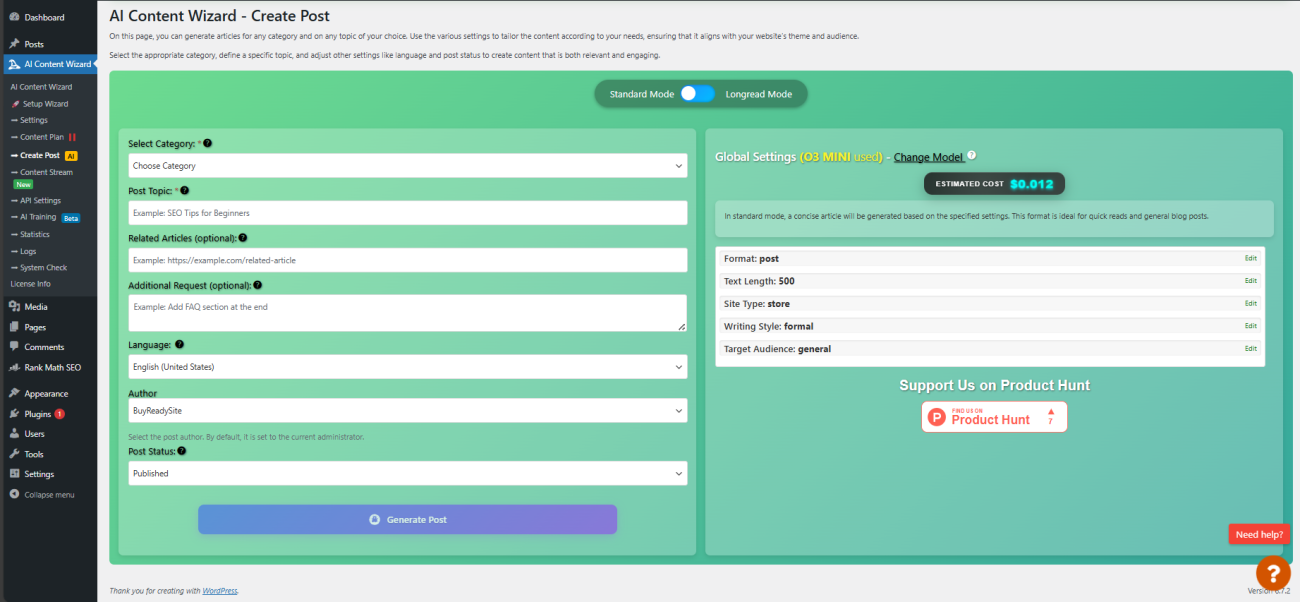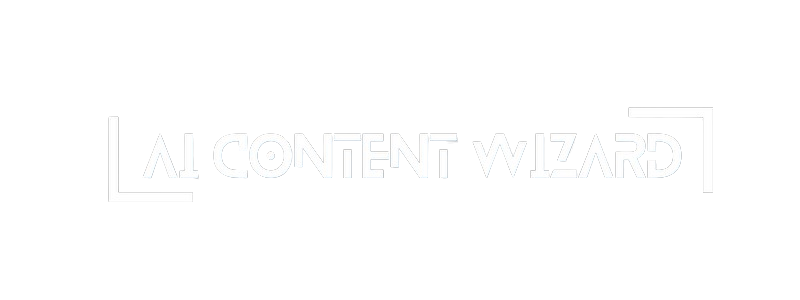1. Overview #
On this page you can generate a single article using AI. The interface is designed to let you select a category, provide a post topic, and fine‐tune various global and category‐specific settings. In addition, you can choose between two generation modes:
- Standard Mode:
Generates a concise article ideal for quick reads or general blog posts.
Advantages:- Fast generation
- Lower cost
- Suitable for regular posts
- Longread Mode:
Generates an extended, expert-level article (20,000–100,000 characters) available only in single-generation mode.
Advantages:- In-depth coverage of topics
- Enhanced SEO value due to length and detail
- Ideal for comprehensive, long-form content
Note: Longread mode is available only for individual post generation and may be supported only by certain AI text models.

2. Interface & Settings #
A. Mode Selection #
- Mode Toggle:
At the top of the page, a toggle switch lets you choose between Standard Mode and Longread Mode.- Standard Mode:
The default mode for generating a standard post. - Longread Mode:
When enabled, additional settings appear for adjusting the approximate text length (via a slider), additional images count, and optional YouTube video inclusion. - Important: If your current text model does not support Longread Mode, a notification (an info icon) will appear indicating that Longread Mode is unavailable.
- Standard Mode:
B. Input Fields #
- Category:
- A dropdown list displays all available categories.
- Tip: For best results, ensure that each category has at least a few existing articles. This helps the AI understand the context and tone for that category.
- The system also pulls in category-specific settings (such as generation wishes and the assigned author) in the second column of the interface.
- Post Topic:
- Enter a specific topic or title for your post.
- A clear, well-defined topic helps the AI generate focused and coherent content.
- Additional Settings (Longread Mode only):
When Longread Mode is activated, an extra section appears containing:- Text Length Slider:
Choose the approximate desired text length (from 20,000 to 100,000 characters).
This setting directly influences how long and detailed your generated article will be. - Additional Images Count:
A slider to set the number of additional images to include in the article.
Higher numbers may enhance visual appeal and SEO but can increase the overall generation cost. - YouTube Videos (Optional):
A checkbox to include YouTube videos, plus a slider to set how many videos to include.
Useful if you want multimedia content embedded in your long article.
- Text Length Slider:
- Related Articles:
- An optional field where you can enter one or more URLs of related articles.
- Purpose:
Helps the AI reference existing content for continuity and enhanced context.
- Additional Request:
- A text area for any extra instructions (e.g., “Add a FAQ section at the end” or “Emphasize SEO keywords”).
- Tip: Clear additional requests allow the AI to tailor the output even more closely to your needs.
- Language Selection:
- A dropdown to choose the language in which the article should be generated.
- Note: The chosen language affects both the tone and the SEO relevance for your target audience.
- Author:
- A dropdown for selecting the post author. By default, it is set to the current user (usually the administrator).
- Purpose:
Specifies the byline for the generated post.
- Post Status:
- A dropdown list that lets you choose the publication status (Published, Draft, Pending Review, Private, Scheduled, or Trash).
- Tip: Choosing “Published” will make the post live immediately, while “Draft” or “Pending” allows for review and editing before going live.
- Cost Estimation:
- In the interface’s right-hand area, the system displays an approximate cost for generating the article.
- This estimated cost takes into account the chosen settings, including global settings (format, text length, style, etc.) and the category-specific settings.
- Tip: Reviewing the estimated cost can help you balance between content quality and budget.
3. Generation Process and Stages #
The article generation process consists of several key stages:
- Keyword Generation:
- The system first extracts or generates relevant keywords based on the post topic and category.
- These keywords help to guide the content creation and SEO optimization.
- Content Creation:
- The AI generates the body of the article based on the provided topic, category settings, and any additional requests.
- In Standard Mode, this results in a concise article; in Longread Mode, it produces an in-depth, extended post.
- Additional Images (if enabled):
- Depending on your settings, the system adds additional images to enhance visual appeal.
- The number of additional images is determined by the slider in the Longread Mode section (or global additional images settings in Standard Mode).
- Featured Image:
- The system identifies and includes a featured image for the post.
- This is particularly important for blog layout and SEO.
- SEO Optimization:
- The process includes generating ALT texts for images, optimizing headlines, and ensuring that internal linking and SEO best practices are considered.
- The interface displays an estimated SEO cost and benefits based on your selected settings.
- Finalization:
- Once the above stages are completed, a preview is shown.
- You have the option to view the generated post or trigger the generation of another article.
Note: The interface uses a progress bar with icons to visually represent each stage of the generation process. These icons update in real time to indicate progress—from keyword generation to content creation, additional image processing, featured image selection, SEO optimization, and finally completion.
4. Summary #
The Single Generation Interface page allows you to create a post on-demand using AI. You can choose between:
- Standard Mode: Quick, concise article generation.
- Longread Mode: Extended, expert-level article generation with additional multimedia options.
Key functionalities include:
- Detailed control over post parameters (category, topic, additional requests, language, author, and status).
- Dynamic estimation of generation cost based on selected settings.
- A clear, step-by-step progress indicator showing the stages of article generation.
- Integration of category-specific settings (such as frequency, generation wishes, and assigned author) which improve content relevance.
- Real-time feedback with a timer and progress bar during the generation process.
This page not only guides you through setting up and fine-tuning your post but also offers real-time insights into the cost and process of generating quality content with AI.




